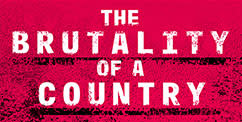Between the World and Me : A Journey, Not a Vacation
Over the next few weeks, The Atlantic will be publishing a series of responses to Ta-Nehisi Coates’s Between the World and Me. (An excerpt is available online.)
This is the fourth in a series. Readers are invited to send their own responses to hello@theatlantic.com, and we will post their strongest critiques of the book and the accompanied reviews. To further encourage civil and substantive responses via email, we are closing the comments section. You can follow the whole series on Twitter at #BTWAM, or to read other responses to the book from Atlantic readers and contributors.
To discuss “Between The World and Me” is to ask fundamental questions as to why readers read and writers write. It seems so many responses—like David Brooks’s greatly debated column—have attempted to judge how Ta-Nehisi Coates sees the world, as if he had offered a proof for a long-vexing mathematical theorem: I think he got this right but I have doubts about that.
Responses to Ta-Nehisi Coates's Between the World and Me
Read More
Why does this need arise? Great books are written because writers need to write them; they are compelled by the deepest of human instincts to tell their story, to shout to the world what it is to be them. This is my life. Listen.
Between the World and Me is a great book. It sears your soul. It is inevitably and appropriately compared to James Baldwin and, like Baldwin, it belongs in that broad canon of passionate first-person work: George Orwell’s Homage to Catalonia, Mary Karr’s The Liar’s Club, Angela’s Ashes by Frank McCourt, Running in the Family by Michael Ondaatje. I can’t imagine that it won’t be read for a very long time.
Recommended: Who Won the Republican Presidential Debate?
The essence of reading is to experience different worlds, to live in other skins, to be transported to a time and place and perspective not our own. It is the magical connection between writer and reader that something as simple as words on a page can accomplish the seemingly impossible. To read Between the World and Me is to live in a world that I and, I suspect, many other readers, do not inhabit. It is a journey, not a vacation. You begin and end in a different place, and your world is never quite the same.
It is a danger of passionate writing that the words explode on the page as if hurled in an emotional fit that quickly becomes tiresome and repetitive. But Coates has worked hard to find a language and a rhythm that startles the reader and forces a connection to the page. “But all our phrasing—race relations, racial chasm, racial justice, racial profiling, white privilege, even white supremacy—serves to obscure that racism is a visceral experience, that it dislodges brains, blocks airways, rips muscle, extracts organs, cracks bones, breaks teeth. You must never look away from this.”
Through this deeply moving cascade of emotions, I am left with a father’s overwhelming love for his son.
That phrase—“You must never look away from this”—is at the heart of Coates’s writing. He has spent a good part of his life working to perfect a means to express what it is to live his life, to feel what he feels, to know what he knows. A deep love of writing resonates throughout this book and his life, and one of the quiet joys of Between the World and Me is his discovery of books and writers and the transformation that Howard University—“The Mecca,” he lovingly calls it—brought to his life.
The conceit of writing the book as a letter to his son is not a random literary device. This is a very private, intimate book, deeply revealing. It breathes with doubt, love, sorrow, regret, anger, hope. But through this deeply moving cascade of emotions, I am left with a father’s overwhelming love for his son. Such love is a great gift. And we are fortunate Ta-Nehisi Coates shared it with us in Between the World and Me.Read more from The Atlantic:
This article was originally published on The Atlantic.

 Yahoo News
Yahoo News 
